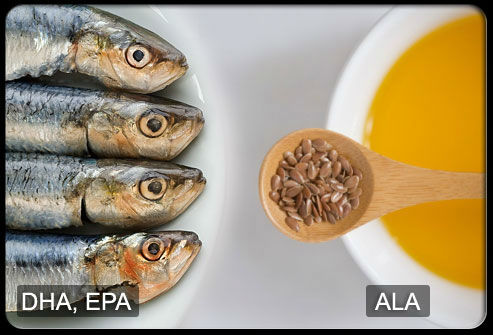Is The Omega 3/6 Ratio Perception or Reality?
There’s an excellent report from Food Insight about the legitimacy of health claims made about the Omega6/Omega 3 fatty acid ratio. You have to download the PDF at the link.
There are a lot of graphs/statistics, but it’s excellent if you can slog through it. Highly recommended.
Lots of pundits attribute great importance to the ratio, claiming that it’s the basis of many other health problems.
According to the latter report, all those claims are a crock.
Problems With the Omega3/6 Ratio
Most clinical studies suggest Omega 6 consumption in moderate quantities is good for you, and focusing on the Omega6/3 ratio has the following problems:
1). It says nothing about the absolute intake of either….which is also very important.
2). It doesn’t differentiate between the different types of N-6 and N-3….there are more than one of each.
3). It doesn’t clarify whether it’s a reduction of N-3 fatty acid consumption or an increase in N-6 consumption that causes the problems.
People purporting the benefits of the ratio are (at best) making an attribution error. The ratio is a symptom of other nutrition habits (like an out of whack meat/plants ratio) that have degenerating effects.
Overly Simplistic Diet Rules
As a general rule, be suspicious of “single variable” eating strategies. Whether it be an ingredient (gluten, fat, lactose, etc) or measurement (n6/n3 ratio, pH, etc).
Your body is complicated, making claims about the importance of a single factor probably false.
Like Einstein said…..“Everything should be made as simple as possible, but not simpler.”

I love this post. Yes, I agree with Einstein that everything should be made simple, but not too simple. I always thought I was supposed to be buying Omega 3-6-9. Doctors seem to think that’s the best, but it always seemed like a marketing thing to me. I mean, why else would they sell Omega 3, 6, and 9 all separately? Hmmm…?
LikeLike
Saying the ratio is a myth is simpler than it should be 😉 The truth is, the biochemical reactions ARE complex. The studies aren’t “a crock”…rather, 99% of the health claims that get pushed to consumers are.
LikeLike
@Kristy, I agree that buying different oils separately may not be necessary, especially if you’re eating properly. There are a variety of common foods which are good sources of all 3.
LikeLike
@Fish_oil – I wouldn’t argue against the benefits of the oils themselves, per se, but all else being equal, I don’t think the Omega3/6 ratio is all that important. You’re right to distinguish between the claims and the reports, but using the ratio as a metric for diet quality has serious drawbacks.
LikeLike
@Jonathan, that is true! It’s hard to try and figure out which foods are a good source of all 3 oils. I am going to do some research on it now! 🙂
LikeLike
Hmmm, interesting. “Most clinical studies suggest Omega 6 consumption in moderate quantities is good for you”. I will keep this info in mind next time I am buying my fish oil capsules. I tend to look for the best possible fish oil or cod liver oil I can find. Thanks for helping me in my research 🙂
LikeLike
@kaycemick – no problem! Omega 6 actually has health benefits that are fairly similar (but not exactly the same) as omega 3, and a mix of both is good. If you’re interested in fish oil, i do suggest reading the presentation that I linked to. I found it very informative.
LikeLike
[…] plant oils and veggies. Ditto for the anti-oxidants found in grass-fed beef. Likewise, there are a lot of reasons to suspect that the Omega6/3 ratio is not all that important to begin with. To make matters worse, a lot of the fatty acid content is lost when cooking, making the […]
LikeLike
[…] do not think the omega 3/6 ratio is the be-all-end-all of nutritional well-being. There are a few reasons to be skeptical about it. But it does play an important role in tipping the scales for certain metabolic see-saws which […]
LikeLike